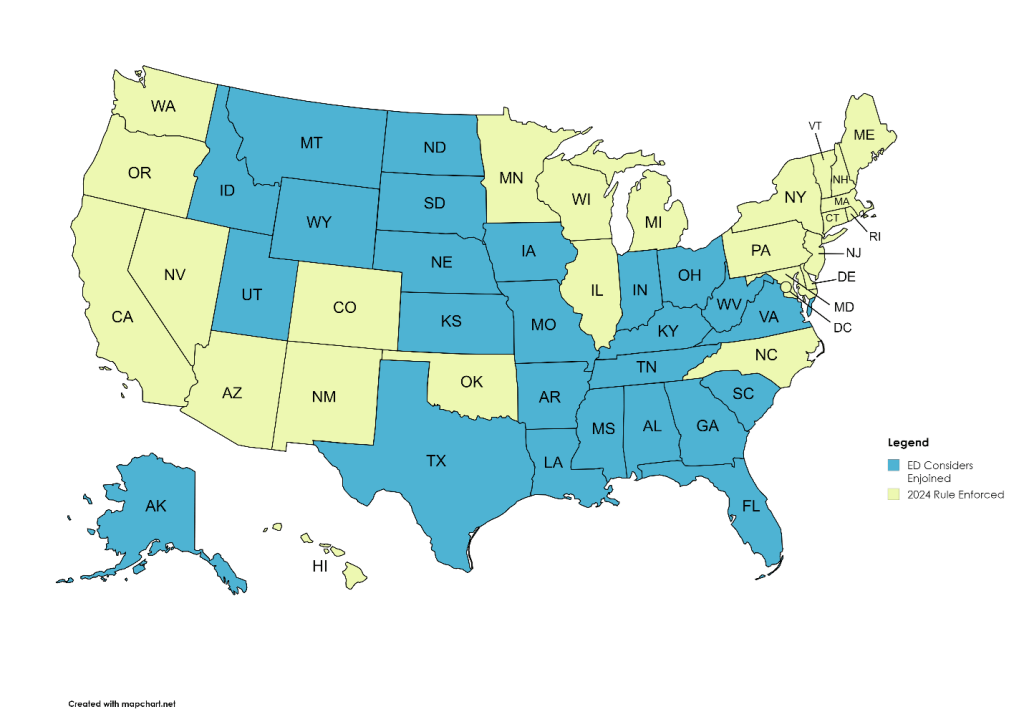Quick Hits
- At least six federal courts have issued injunctions barring enforcement of the U.S. Department of Education’s 2024 Title IX rule, which applies to complaints of sex discrimination occurring on or after August 1, 2024.
- Many of the injunctions lack clarity as to which institutions are covered.
- The Department issued guidance specifying the states and schools subject to the enforcement injunction due to a student or parent’s membership in a plaintiff organization.
For example, on July 31, 2024, the U.S. District Court for the Western District of Oklahoma entered an injunction barring enforcement of the 2024 Rule limiting the injunction “to the state of Oklahoma.” The court did not specify whether the Department is prohibited from enforcing the 2024 Rule against the plaintiff State of Oklahoma, or from enforcing the 2024 Rule against all institutions, public or private, located in Oklahoma.
To make matters worse, the U.S. Court of Appeals for the Eleventh Circuit issued a broadly worded injunction that led some administrators and commentators to believe the court had enjoined the 2024 Rule on a nationwide basis. On July 30, 2024, the U.S. District Court for the Northern District of Alabama issued an order denying the injunction requested by several plaintiff states—the first court to deny a requested injunction in connection with the 2024 Rule. Just over one hour after the court issued its order, the plaintiff states filed an “Emergency Notice of Appeal,” requesting that the Eleventh Circuit temporarily bar the Department from enforcing the 2024 Rule “in Alabama, Georgia, Florida, and South Carolina.” On July 31, 2024, the Eleventh Circuit responded with an otherwise unexplained administrative injunction barring the Department “from enforcing the [Rule] pending further order of this Court.” The order contained no limitation on the geographic scope of the injunction, resulting in confusion about its scope. The Department, however, immediately filed a notice of compliance, stating its understanding that “the administrative injunction [would] apply only within the plaintiff states of Alabama, Florida, Georgia, and South Carolina.” (Emphasis added.)
Fortunately, in response to the patchwork of injunctions across the country, and while awaiting the Supreme Court of the United States’ ruling on the applications for a partial stay of two injunctions issued, the Department has taken a clear and cautious approach to enforcement of the 2024 Rule, deciding not to attempt enforcement of the 2024 Rule within any state affected by an injunction. The Department’s Title IX regulation webpage contains the following guidance respecting the geographic scope of the injunctions:
As of July 31, 2024, pursuant to Federal court orders, the Department is currently enjoined from enforcing the 2024 Final Rule in the states of Alabama, Alaska, Arkansas, Florida, Georgia, Idaho, Indiana, Iowa, Kansas, Kentucky, Louisiana, Mississippi, Missouri, Montana, Nebraska, North Dakota, Ohio, Oklahoma, South Carolina, South Dakota, Tennessee, Texas, Utah, Virginia, West Virginia, and Wyoming.
While the geographic scope of actual injunction orders remains unclear, an institution may choose to rely on the Department’s statement to determine whether it is located in a state where the Department will (or will not) seek to enforce the 2024 Rule at this time.

States (in blue) where the U.S. Department of Education considers the 2024 Rule enjoined on a statewide basis (not including individual institutions affected by the Kansas injunction)
There are, however, many institutions affected by an injunction even if they are located in a state without a statewide injunction (green states above, such as Pennsylvania and California). An earlier injunction issued by the U.S. District Court for the District of Kansas further enjoined enforcement of the 2024 Rule against institutions attended by members, or children of members, of certain organizations joining the states as plaintiffs. The affected institutions include 688 public and private institutions located in virtually every state in the United States. The Department now also advises that the 2024 Rule and the Department’s compliance resources “do not currently apply in those states and schools.” The Department helpfully published a list (which may be supplemented in the future) of the schools subject to the enforcement injunction due to a student’s or parent’s membership in a plaintiff organization.
Many administrators whose institutions were affected by one of the enforcement injunctions were left wondering whether to stick with their Title IX policies based on the 2020 Rule, or whether they were permitted to adopt policies compliant with the 2024 Rule despite the injunction in effect. The Department also attempted to answer that question, stating, “Pending further court orders, the Department’s Title IX regulations, as amended in 2020 (2020 Rule) remain in effect in those states and schools.” Therefore, institutions affected by an injunction may want to analyze before adopting a new policy whether that policy conflicts in any way with the 2020 Rule.
Ogletree Deakins’ Higher Education Practice Group will continue to monitor developments related to the litigation challenging the 2024 Title IX regulations and will provide updates on the Higher Education and State Developments blogs as additional information becomes available.
Follow and Subscribe







